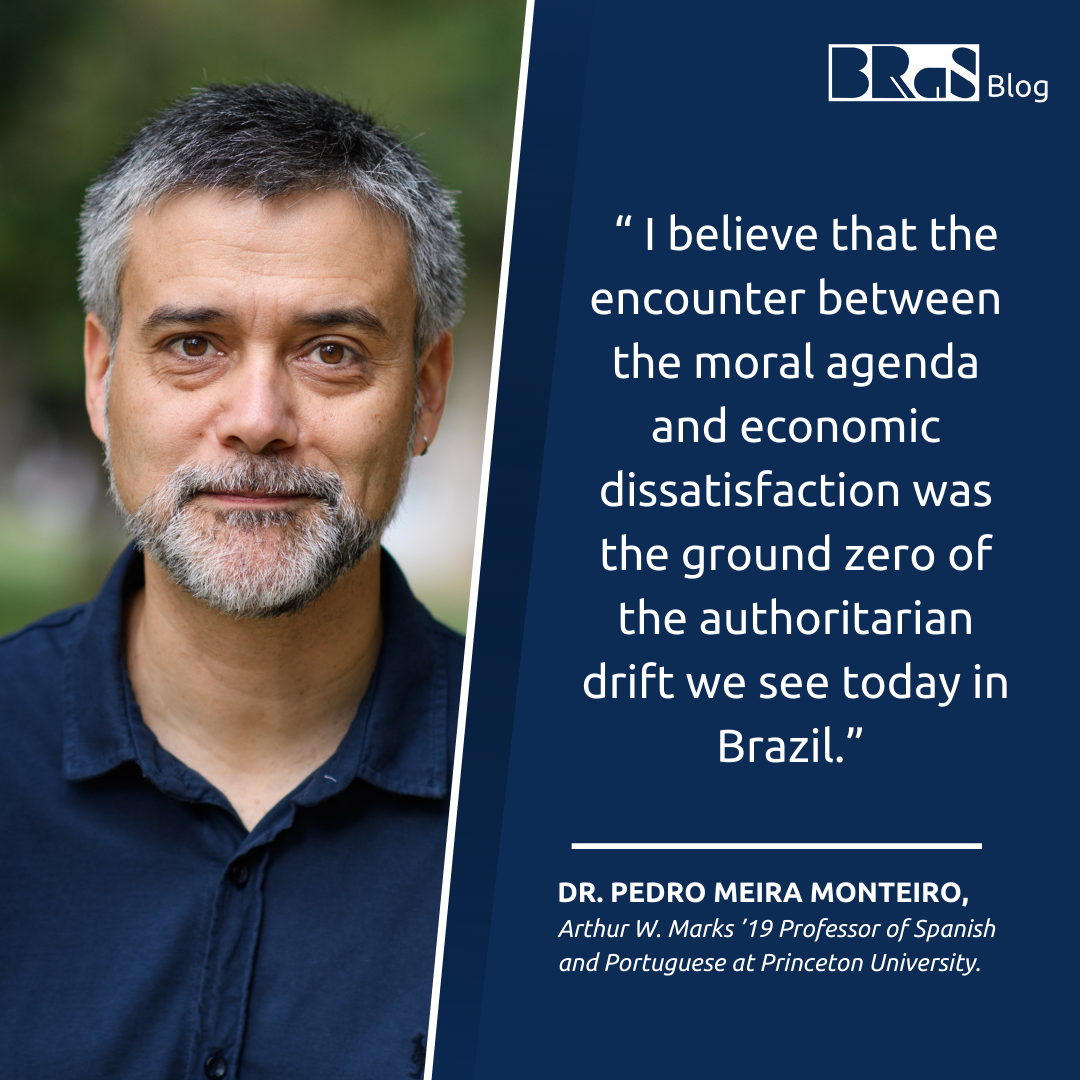by Prof. Dr. Leonardo Barros Soares (UFPA) [1] and Prof. Dr. Stephen Grant Baines (LAGERI/UnB) [2]
Reviewed by Giovanna Imbernon
The Brazilian president Jair Bolsonaro is clear about his stance on indigenous issues and peoples. Already during his presidential campaign, he said that his administration would not demarcate “even a centimeter” of indigenous lands, a promise that he is keeping. Recently, he would say that indigenous peoples were “evolving” and that they were “almost humans like us.” Not surprisingly, there is a widespread perception that the violence against indigenous peoples increased because perpetrators find encouragement in the president’s prejudicial assessments regarding such populations and his frequent appeals to invade indigenous lands.
Cracking down on Indigenous peoples and their rights is a core part of Bolsonaro’s plan to deal with Brazilian minorities. However, how, precisely, is his government doing this? We consider that three ongoing dismantling processes are targeting the Brazilian indigenist policy[i] under Bolsonaro’s government: 1. The dismantling of land claims recognition policy and institutions; 2. The dismantling of the protection of indigenous lives due to the increasing violence against indigenous peoples and the Covid-19 pandemic; 3. The dismantling of the integrity of traditional territories related to government plans to open indigenous lands to large-scale agricultural and mining operations. We will address each one of them briefly.
We use the policy dismantling literature as our guide to understand what we have been calling “attacks” in indigenist policy. We assume that the dismantling of a policy is a subcategory of policy change, i.e., a concept focused on explaining a change that ultimately terminates the policy under scrutiny (Bauer and Knill, 2012). In this paper, we are particularly interested in shedding light on the effects of policy dismantling on Brazil’s formal intensity of the indigenist policy. It relates to actions taken by the Brazilian government to decrease enforcement, administrative and procedural capacities of the institutions and regulations regarding indigenous issues in the country.
Regarding the first point, the overall progression of the demarcations over time can be fairly described as being consistently low over time, a pattern broken by a few moments where the government was more active than usual. The outlier was Collor’s government (1990-1992) during which he demarcated the most considerable number of indigenous lands ever and the largest ones. Except for the current aberrant period, the Brazilian Indigenous Land Claims Policy has been effective, although inefficient. Now, under Bolsonaro’s administration, it is neither. His government did not recognize a single traditional land since January 2019.
The “remilitarization” of the indigenist policy is also a feature of Bolsonaro’s government. By this term, we understand the process of taking over some of the key posts of the FUNAI (National Foundation on Indigenous Peoples) by military staff in disfavor of civil servants. It is relevant to consider that indigenous issues were military responsibility since the beginning of the twentieth century, and military personnel was involved in the design of indigenist policies and normative regulations for decades. Moreover, the militarization of the government is a fact in several policies, and indigenous policy is no exception. There are now over 6,000 members (3,029 still in active duty) performing civilian activities in the administration. The highest number ever, not even found during the civil-military dictatorship (1964-1985)[ii].
Regarding the protection of indigenous lives, we could point out the growing violence against indigenous peoples and the Covid-19 pandemic spreading across those communities. Following the tracking of homicides of indigenous peoples in Brazil carried out by the Conselho Indigenista Missionário (Cimi) – a missionary organization linked to the Brazilian Catholic Church – there were 135 killings in 2018. Although there is no data for the first year of Bolsonaro’s government (2019), we can observe a pattern of increasing violence since 2013. As a proxy to this figure, we could mention 2019’s 23% increase of conflicts in the countryside compared to 2018 available data [iii]. There is no reason to doubt that this trend will continue during the years ahead.
The negligence of the Brazilian government in dealing with the Covid-19 pandemic is also astonishing. By May 3, 2021, there were 53.329 confirmed cases, 1.060 dead and 163 indigenous peoples affected. The Mato Grosso region is the most affected one, with 4.349 confirmed cases so far. Even before such a grim scenario, the government reduced by 9% the money spent by the Secretaria Especial de Saúde Indígena (SESAI, Special Secretariat of Indigenous Health) in the first half of 2020 compared to the same period in 2019[iv]. Not surprisingly, an increasing number of political actors raise concerns over what they perceived as a genocide caused by the inaction of Bolsonaro’s administration[v].
A terrifying effect of the pandemic among indigenous peoples is the deaths of elders and experienced leaders. Only during last year, there were several famous cases such as 1. Paulinho Paiakan, one of the most prominent Kayapó leaders during the 1988 constitutional assembly[vi]; 2. Nelson Rikbaktsa, an increasing charismatic young leadership in the northwestern part of the country[vii]; 3. Aritana Yawalapiti, one of the most prominent leaders of the Xingu region over the last fifty years and considered one of the greatest Brazilian indigenous leaders[viii]. Indigenous elders are valued in their communities because they are “living libraries” of their peoples, frequently being the ones who still speak their mother tongues and keep the traditions alive. Every loss is incalculable.
Finally, dismantling the integrity of the traditional territories has to do with plans to authorize mining and large-scale farming within indigenous lands. There are several legislative proposals in both chambers of congress regarding this topic. The most threatening one is the legislative Proposal for Constitutional Amendment nº215/00, which the ruralist caucus has been trying to approve over the last twenty years, unsuccessfully thus far (Soares, 2017). Briefly, the proposal aims to strip the FUNAI’s constitutional mission to demarcate lands and move it to the parliament. Moreover, nine Legislative Decree Proposals in the lower chamber ask for the suspension of already demarcated indigenous lands; another six legislative initiatives target indigenist policies[ix].
Brazilian indigenous peoples have been facing threats to their existence since the beginning of colonization. They were enslaved and had their lands taken by settlers and colonial and imperial administrations and were on the verge of extinction in the early twentieth century. However, as a phoenix reborn from the ashes, they have been able to organize and mobilize themselves collectively and achieved significant political goals such as the constitutionalizing of their rights and recognizing their traditional lands by the Brazilian state.
The convergence of the lines of political action briefly described above carried out by Bolsonaro’s government can amount to an ever-growing genocide of Brazilian Indigenous peoples that is happening right now under international watch. We hope that this short article may help spread the word about the critical situation that indigenous people are going through in contemporary Brazil.
References
[i] Indigenist policy is the public policy towards indigenous peoples designed and implemented by nation-states. Indigenous politics are the political activities carried out by indigenous peoples.
[ii] https://g1.globo.com/politica/noticia/2020/07/17/governo-bolsonaro-tem-6157-militares-em-cargos-civis-diz-tcu.ghtml. Access in: August 21, 2020.
[iii] The number of conflicts in the countryside was calculated by the Comissão Pastoral da Terra, another religious organization linked to the Catholic Church. Available at: https://www.cptnacional.org.br/publicacoes-2/destaque/5167-conflitos-no-campo-brasil-2019. Access in: August 19, 2020.
[iv] https://oglobo.globo.com/sociedade/mesmo-com-coronavirus-gastos-com-saude-indigena-cairam-9-no-primeiro-semestre-1-24593478?versao=amp&__twitter_impression=true. Access in: August 19, 2020.
[v] There is a heating debate on the topic in the country. Indigenous peoples, their organizations, and allies do not doubt that they are facing a genocidal process. Even one of the most controversial judges of the Brazilian Supreme Court, Gilmar Mendes, affirmed that the military personnel acting in the civil administration was “associated with an ongoing genocide” of the Indigenous peoples, a comment that sparked outrage by them. Cf: https://noticias.uol.com.br/saude/ultimas-noticias/redacao/2020/07/11/gilmar-mendes-exercito-esta-se-associando-a-genocidio-na-pandemia.htm. Access in: August 19, 2020.
[vi] https://www1.folha.uol.com.br/cotidiano/2020/06/morre-lideranca-caiapo-paulinho-paiakan-vitima-da-covid-19.shtml. Access in: August 19, 2020.
[vii] https://cimi.org.br/2020/07/nota-de-solidariedade-myky-ao-povo-rikbaktsa/; Access: August 19, 2020.
[viii] https://www.correiobraziliense.com.br/app/noticia/brasil/2020/08/05/interna-brasil,878682/morre-de-covid-cacique-aritana-yawalapiti-ativista-de-direitos-indige.shtml. Access in: August 19, 2020.
[ix]http://www.mpf.mp.br/atuacao-tematica/ccr6/documentos-e-publicacoes/acompanhamento-de-tramitacao-de-propostas-legislativas/documentos/acompanhamento-legislativo_1-k.pdf. Access in: June 20, 2020.
_________________________________
[1] Ph.D. in Political Science from Federal University of Minas Gerais (UFMG), Brazil. Former Indigenist Agent of the Fundação Nacional do Índio (FUNAI, Brazilian National Foundation on Indigenous Peoples) and currently Professor of the Graduate Program in Political Science at the Federal University of Pará (UFPA). Postdoctoral Researcher at the Department of Latinamerican Studies at the University of Brasília (UnB). Fellow of the Réseau d’études latino-américaines de Montréal – RÉLAM/Université de Montréal. E-mail : leobarros@ufpa.br
[2] Ph.D. in Anthropology from the University of Brasília (UnB), Brazil. Full Professor of the Department of Anthropology and Coordinator of the Laboratório e Grupo de Estudos em Relações Interétnicas (LAGERI/UnB). E-mail: stephengbaines@gmail.com
* This article summarizes the argument of a full paper firstly delivered at the “Democracy & Autocracy” section’s “Emerging Scholar Research Development workshop” at the American Political Science Association’s September 9, 2020 annual meeting. A second version was presented at the “Tests and prospects for democracy and human rights in Brazil” workshop, held by the Center for Brazil Studies, David L. Boren College of International Studies, University of Oklahoma, February/March 2021. The full paper will be coming out until December 2021 in a special issue of the Revista Videre (https://ojs.ufgd.edu.br/index.php/videre).






